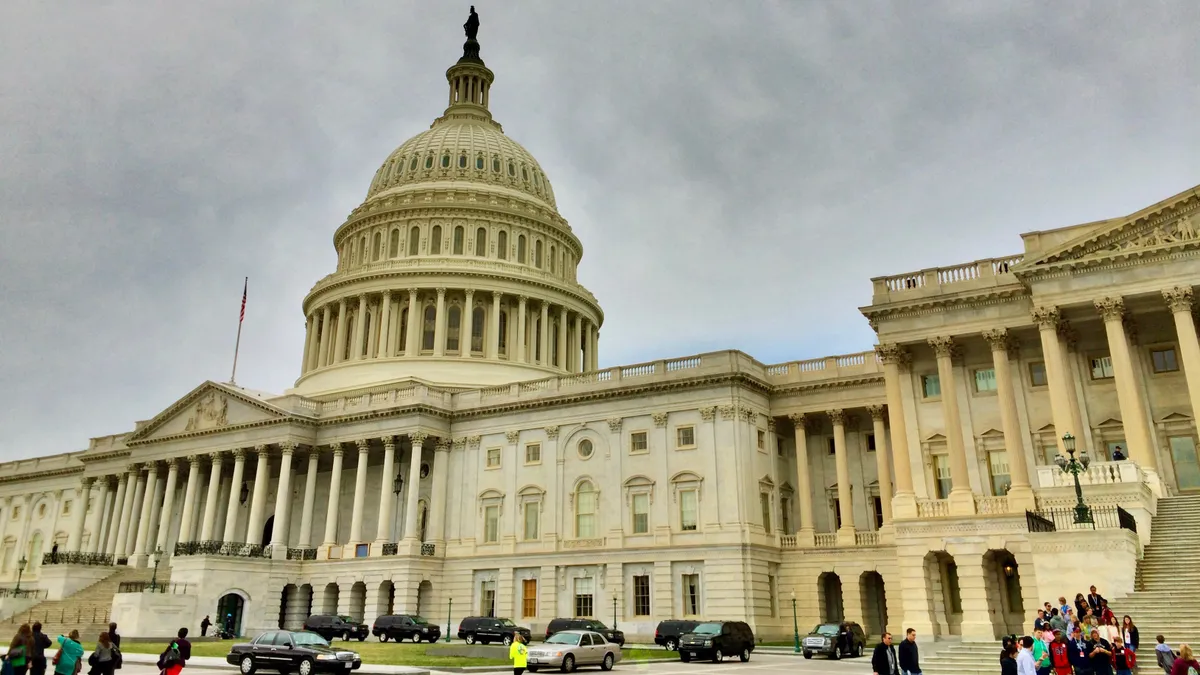Dive Brief:
- Republicans raised several lines of attack yesterday at a U.S. Senate Committee on Appropriations hearing on President Joe Biden's American Jobs Plan and Congress' efforts to translate that into an infrastructure package. Chief among Republican arguments is that the plan strays too far from traditional infrastructure investment.
- There is bipartisan support for an infrastructure package, but "the administration's proposal is so broad and ambiguous ... that it seems there is little if anything they do not consider or call infrastructure," Sen. Richard Shelby, R-Ala., vice chair of the committee, said in his opening statement.
- Sen. Susan Collins, R-Maine, was also critical of proposed purchase incentives for electric vehicles (EV) relative to spending on roads and bridges. And Sen. John Kennedy, R-La., questioned whether the president's plan would have a meaningful impact on global climate change in a testy exchange with Michael Regan, the administrator of the U.S. Environmental Protection Agency.
Dive Insight:
The White House on Tuesday sent four agency heads to the Senate to make the case for the president's massive infrastructure proposal. There appeared to be broad agreement among Democrats on the need for aggressive spending to create jobs and combat climate change, but Republicans repeatedly questioned the scope and scale of the plan.
Along with EPA's Regan, the hearing included Secretary of Transportation Pete Buttigieg, Secretary of Commerce Gina Raimondo, and Secretary of Housing and Urban Development Marcia Fudge.
"With respect to the Green New Deal, climate change portion of the president's infrastructure bill, how much is it going to lower world temperatures?" Kennedy asked Regan repeatedly.
While Regan explained that the jobs plan and climate proposal are interrelated but separate, and they reflect the need to "collectively pursue a target," Kennedy continued to press that "a big purpose of the infrastructure bill is to lower world temperatures."
Regan, in the exchange, also noted that Biden intends to announce a "target" at a climate summit with world leaders on Thursday. It has been widely reported that the White House is considering doubling Obama-era targets, to cut greenhouse gas emissions 50% by 2030.
An EPA spokesperson in a statement later said the jobs plan will "provide a critical piece of a comprehensive, all-of-government approach to tackle the climate crisis." Biden's climate plan sets a goal for the United States to achieve net-zero emissions by 2050 and a carbon-free electricity sector by 2035.
Collins appeared critical of proposed spending on electric vehicle purchase incentives, at least relative to other parts of the plan. "I have long advocated for a robust infrastructure package ... however, when I look at President Biden's proposal, it does not seem to embody that philosophy."
Collins noted the plan proposes spending $174 billion on electric vehicle subsidies, charging stations and other electrification spending, relative to $157 billion for roads, bridges, ports, airports and waterways combined.
Under Biden's approach, the U.S. Department of Transportation would spend $100 billion on incentives for consumers to purchase electric vehicles. Another $25 billion would go to support electric transit vehicles, $20 billion for school bus electrification, $15 billion to install a half million chargers across the country, and other electrification efforts
"It's certainly appropriate to look ahead to cleaner modes of transportation, but what the administration is doing is spending billions more on subsidies related to electric vehicles than on the roads and bridges on which they will travel," Collins said.
Buttigieg responded that roads and bridges already have resources available to support them. "When it comes to electric vehicles, we are much earlier in America's story. And what we see now is the story is beginning to show America falling behind. We believe robust public investment is needed."
Plug In America Executive Director Joel Levin pushed back on Collins' preference for more traditional spending.
"Electric vehicles are the future of transportation, so we need significant funding to build out the necessary infrastructure," Levin said in an email. "Plus, EVs bring good jobs in manufacturing, energy, technology, and many other sectors, helping our economy at a time when we really need it."
The United States does also need to invest in roads and bridges, said Levin, but "the time is now for the U.S. to lead the world in transportation electrification or we will be left behind."
The idea that Biden's proposal goes beyond traditional spending came up multiple times during the hearing.
There is "broad bipartisan agreement on the need for investment in our nation's crumbling infrastructure, but the breadth of that support, I think, depends on how broadly the term infrastructure is defined," Shelby said.
Biden's plan "appears to be focused on making new investments in unproven programs rather than expanding investments in proven infrastructure programs," he added.
The Biden administration and Democratic lawmakers made the case, however, that the concept of infrastructure has evolved.
Fudge told senators that the jobs plan and infrastructure program "recognizes that to build our economy and our country back better than before, we need to invest not just in roads and bridges but in housing, clean drinking water and in a modernized electrical grid that can withstand the impacts of climate change."
"Our country cannot afford to look backwards to what we once viewed as the definition of infrastructure," she said.
"I've heard many say that the president's proposal has little to do with infrastructure, and I think that's because they define the term too narrowly," said Sen. Patrick Leahy, D-Vt, chairman of the appropriations committee. "We can no longer view infrastructure as just roads and bridges and rail and highways. It's about our capacity to grow in a global capacity."














